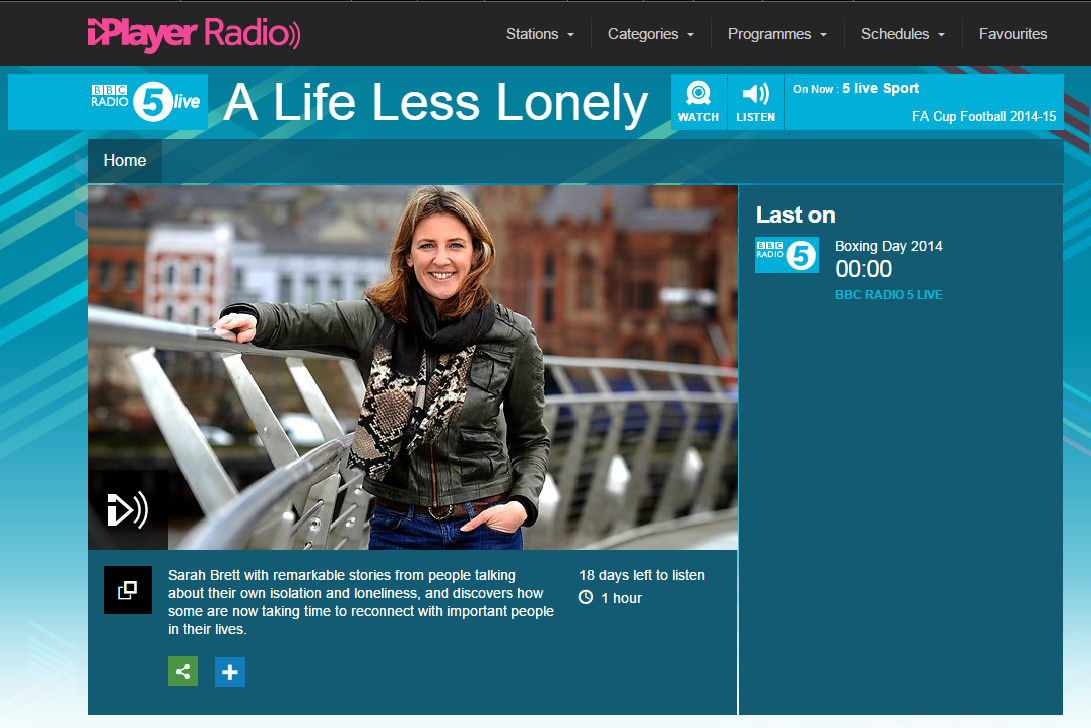February 5th is Time To Change (@timetochange 's #TimeToTalk day), encouraging people to take 5 minutes out of their day to have a conversation about mental health.
It's something that people find hard to talk about, myself included, despite this blog and my media appearances over the last year. There are still large numbers of people to whom mental illness is something to be feared or looked down upon. I've met people who have avoided me after learning that I have depression; I've met people who appeared to think that suffering in this way affected my ability to do my job at all, and who saw it as a red flag, requiring decision making to be taken completely out of my hands. And I've met friends and acquaintances who have not understood and have kindly suggested that I 'pull myself together'. And so on.
When I suffer acute depression episodes one of the things that I find hardest is that I often suffer from feelings of acute defectiveness and failure:
"I'm depressed, there's something intrinsically wrong with me."
"I'm depressed, I will never get better, I have failed as a human being."
"Why can't I just feel better? I'm always lurching back into doom."
"I'm so anxious that I feel physically sick and can't focus on anything; I'm no good and I'll never be able to do anything properly."
In the summer of last year, when I was so ill that I agreed with my psychiatrist that the best course of action was to go into hospital to have more intensive treatment and rest from all the external forces worsening my depression, most particularly the bullying I was experiencing, I had to decide whether to talk about what was happening to me or not. I thought carefully about the people in my life who were my friends, and what would change if they knew that I was depressed. The negative thoughts that I've listed above are completely false in many ways, but I was so depressed and anxious that I needed help to get rid of them. They made me sick with fear that I would lose the friends I so cherish and love, and constantly tearful at the state that I was in,
On the other hand, I didn't want to keep my illness a secret because it was contributing to my illness. I didn't want to accept that it was something to be ashamed of, and something that I should be hiding from other people. Those very perceptions were only exacerbating my illness, because the effort to conceal my true state required something close to the superhuman. The smiles, the jokes, the well turned out woman with styled hair, made up face, with the pretty work dresses and the fabulous shoes (I will never not be wearing fabulous shoes. I'm addicted.) These were my friends and if I had a hope of being better part of that was to be more open about my own illness and how I was feeling. I was afraid of rejection. I was terrified of being seen as a failure and as someone who was damaged. But I wanted to be honest. So I 'came out' from my hiding place and told them.
"Dear friends,
It's something that people find hard to talk about, myself included, despite this blog and my media appearances over the last year. There are still large numbers of people to whom mental illness is something to be feared or looked down upon. I've met people who have avoided me after learning that I have depression; I've met people who appeared to think that suffering in this way affected my ability to do my job at all, and who saw it as a red flag, requiring decision making to be taken completely out of my hands. And I've met friends and acquaintances who have not understood and have kindly suggested that I 'pull myself together'. And so on.
When I suffer acute depression episodes one of the things that I find hardest is that I often suffer from feelings of acute defectiveness and failure:
"I'm depressed, there's something intrinsically wrong with me."
"I'm depressed, I will never get better, I have failed as a human being."
"Why can't I just feel better? I'm always lurching back into doom."
"I'm so anxious that I feel physically sick and can't focus on anything; I'm no good and I'll never be able to do anything properly."
In the summer of last year, when I was so ill that I agreed with my psychiatrist that the best course of action was to go into hospital to have more intensive treatment and rest from all the external forces worsening my depression, most particularly the bullying I was experiencing, I had to decide whether to talk about what was happening to me or not. I thought carefully about the people in my life who were my friends, and what would change if they knew that I was depressed. The negative thoughts that I've listed above are completely false in many ways, but I was so depressed and anxious that I needed help to get rid of them. They made me sick with fear that I would lose the friends I so cherish and love, and constantly tearful at the state that I was in,
On the other hand, I didn't want to keep my illness a secret because it was contributing to my illness. I didn't want to accept that it was something to be ashamed of, and something that I should be hiding from other people. Those very perceptions were only exacerbating my illness, because the effort to conceal my true state required something close to the superhuman. The smiles, the jokes, the well turned out woman with styled hair, made up face, with the pretty work dresses and the fabulous shoes (I will never not be wearing fabulous shoes. I'm addicted.) These were my friends and if I had a hope of being better part of that was to be more open about my own illness and how I was feeling. I was afraid of rejection. I was terrified of being seen as a failure and as someone who was damaged. But I wanted to be honest. So I 'came out' from my hiding place and told them.
"Dear friends,
As some of you know I have been having a hard time at work recently with some bullying and difficult people, which has made me very upset. Unfortunately because I also suffer from depression I've now come to the point where I can't cope anymore with working.
I've decided with the help of my superb doctors and counsellor to go into hospital to recover from some of the impacts of this situation. I will probably be in hospital for 1-2 weeks, we think.
I would love to receive text messages or messages of support during this time - and of course, despite its very inconvenient location - you are most welcome (and encouraged by my doctor) to visit. However I won't expect this as I know many of you might find it difficult.
I hope you understand why I wanted to be honest with this with you and I hope that you can support me.
Sending much love xxx Jessica"
At the time of writing this email, I cried. I cried when my mobile rang a minute or two later with a call from one of my friends ringing in response. I couldn't answer the phone because I was crying, and I cried when I heard the answerphone message sending love and reassurance that my condition didn't affect our friendship at all. And still I cried.
Why did I cry so much? I think it was because I did not believe that my friends would stick by me, someone who was defective and a failure. Who wants to spend time with someone who's so down in the dumps that they have to go into hospital? Who wants to be friends with someone who's been bullied? Doesn't that mean that there's something wrong with me?
No.
Had I not sent the email above I don't think I would have made as much progress in hospital learning that the negative thoughts above were symptoms of my depression and not fact. Had I not told the truth I would have been holding back on my recovery. And when I did tell the truth I realised that I could be myself - illness and all - and I would still have support from those who cared enough about me to understand, or to learn more about what it really means to have a mental illness, and those at work ready and willing to listen - many more people than I expected.
More than this, though, was the aftermath. I have gradually become braver about talking about my condition. I have made myself speak to the press about my experiences as a way of training me to talk to others about my condition and how I need adjustments to help me to deal with it. And I hope that I will continue to get better at talking about mental health, because I am an example of how there is no one-size-fits-all mental illness sufferer. We come in all states, shapes and sizes.
So, along with other supporters of #timetotalk, on 5th February I will be spending a good part of the day having 'honest conversations' at work about my mental health and about mental health in general. I will be inviting my husband to dinner and talking to him about mental health, something which he has had to learn about through nearly 10 years with me suffering the ups and downs of depression, anxiety, medications of different kinds and their varying side effects. I will be speaking to my family about it through email, phone calls and posts on Facebook, and I will be tweeting @volette to record my thoughts throughout the day.
I feel I must keep talking about mental health to try to help myself accept myself as I am, styled or dishevelled, weeping and weary or well. And I want to try to help others understand the complexities of these illnesses and the impacts that they may have on sufferers, from the personal perspective I can offer. I would love you to join in with this conversation and spare 5 minutes on 5th February have a conversation about mental health. Whether you're a sufferer, know someone who is, or know nothing about it at all, it's so important that we keep the conversation going. Taking the time to talk will make a difference. Perhaps more than you know.






























